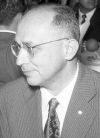Adolfo Aizen: Difference between revisions
Brazilian publisher. |
mNo edit summary |
||
| Line 11: | Line 11: | ||
'''Adolfo Aizen''' was a born Russian journalist and editor, naturalized Brazilian. | '''Adolfo Aizen''' was a born Russian journalist and editor, naturalized Brazilian. | ||
He is considered to be the "father of comics in Brazil" as he introduced many American comics such as "[[Mandrake the Magician]]", "Tarzan" , "Dick Tracy" , "Prince Valiant", "Flash Gordon" amongst others. | |||
At age 15, he moved to Rio de Janeiro and in 1933, he began working at the publishing house "O Malho", responsible for the magazine "O Tico-Tico" before | At age of 15, he moved to Rio de Janeiro and, in 1933, he began working at the publishing house "O Malho", responsible for the magazine "O Tico-Tico" before launching - the next year - his own comics magazine "[[Suplemento Juvenil]]", that mainly with characters belonged to [[King Features Syndicate]]. This comics supplement accompanied the newspaper "A Nação", the way New York newspapers did before with great success. With excellent sales, the supplement began to be circulated by the publisher "[[Grande Consórcio de Suplementos Nacionais]]" founded by Aizen himself. In 1937 with this new publishing house, Adolfo Aizen lunched another sucessful comics magazine: "[[Mirim]]". It's worth noting that [[Roberto Marinho]], owner of the competing newspaper "[[O Globo]]", had previously rejected Aizen's idea of such a comics magazine, but when he saw the success of the latter he decided to create also is own children's supplement with the title "[[O Globo Juvenil]]". | ||
In 1939 Aizen | In 1939 Aizen launched another comics magazine "O Lobinho", another successful publishing with other classical comics such as "Batman", "Superman", "Doc Savage", "The Spirit", "Plastic Man"... | ||
In 1945, Aizen founded the publishin house [[EBAL]], acronym of "Editora Brasil-América Limitada", a pioneer in introducing Brazilian themes and heroes into comic books. | In 1945, Aizen founded the publishin house [[EBAL]], acronym of "Editora Brasil-América Limitada", a pioneer in introducing Brazilian themes and heroes into comic books. | ||
| Line 26: | Line 25: | ||
=== Two great Brazilian publishers === | === Two great Brazilian publishers === | ||
<gallery> | <gallery> | ||
Image:Adolfo Aizen and Roberto Marinho.jpg|''Roberto Marinho (at left) and Adolfo Aizen (at right | Image:Adolfo Aizen and Roberto Marinho.jpg|''Roberto Marinho (at left) and Adolfo Aizen (at right) together''. | ||
</gallery> | </gallery> | ||
[[Category:Publishers|Aizen, Adolfo]] | [[Category:Publishers|Aizen, Adolfo]] | ||
Latest revision as of 20:21, 26 May 2024
| Adolfo Aizen | |

| |
| Biographical information | |
| Born: | June 10, 1904 |
|---|---|
| Died: | May 10, 1991 |
| Nationality: | |
| Occupation: | Publisher |
| Website: | n/a |
Adolfo Aizen was a born Russian journalist and editor, naturalized Brazilian.
He is considered to be the "father of comics in Brazil" as he introduced many American comics such as "Mandrake the Magician", "Tarzan" , "Dick Tracy" , "Prince Valiant", "Flash Gordon" amongst others.
At age of 15, he moved to Rio de Janeiro and, in 1933, he began working at the publishing house "O Malho", responsible for the magazine "O Tico-Tico" before launching - the next year - his own comics magazine "Suplemento Juvenil", that mainly with characters belonged to King Features Syndicate. This comics supplement accompanied the newspaper "A Nação", the way New York newspapers did before with great success. With excellent sales, the supplement began to be circulated by the publisher "Grande Consórcio de Suplementos Nacionais" founded by Aizen himself. In 1937 with this new publishing house, Adolfo Aizen lunched another sucessful comics magazine: "Mirim". It's worth noting that Roberto Marinho, owner of the competing newspaper "O Globo", had previously rejected Aizen's idea of such a comics magazine, but when he saw the success of the latter he decided to create also is own children's supplement with the title "O Globo Juvenil".
In 1939 Aizen launched another comics magazine "O Lobinho", another successful publishing with other classical comics such as "Batman", "Superman", "Doc Savage", "The Spirit", "Plastic Man"...
In 1945, Aizen founded the publishin house EBAL, acronym of "Editora Brasil-América Limitada", a pioneer in introducing Brazilian themes and heroes into comic books.
In 1947, "Ebal" began publishing the comic book "O Heroi" and in 1947, he launched "Superman", the publisher's longest-lasting title.
The city of Rio de Janeiro paid homage to Adolfo Aizen, with a street in the Campo Grande neighborhood in the West Zone.
Two great Brazilian publishers
-
Roberto Marinho (at left) and Adolfo Aizen (at right) together.
